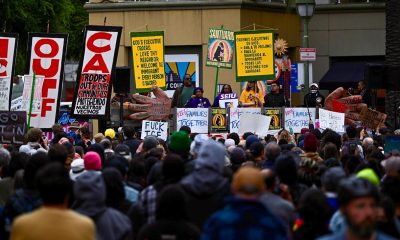Activism
New ‘Street to Home’ Program Expedites Housing People, Reduces Vacancies in City-Funded Homeless Housing in S.F.
“We believe that everyone deserves a safe and stable place to call home,” said Shireen McSpadden San Francisco Director of Homelessness and Supportive Housing. “With Street to Home, we are taking a proactive approach to addressing street homelessness and creating a low barrier way to get people from the street into housing. This pilot program is a testament to our commitment to finding innovative solutions to the challenges our city faces.”

San Francisco Mayor’s Office
The program, which will allow the City to allocate permanent supportive housing units to directly place people from the street into housing, is part of a larger effort to significantly reduce unsheltered homelessness in San Francisco
Mayor London N. Breed announced on Oct. 6 that Street to Home, a new innovative initiative, is expediting the process of providing housing for people experiencing unsheltered homelessness in San Francisco and maximizing the use of existing vacant units in the City’s Homelessness Response System.
The new program, in partnership with Delivering Innovation in Supportive Housing (DISH), is part of the City’s ongoing commitment to bring people inside and connect them to a wide range of existing services and placements.
San Francisco’s Five-Year Strategic Homeless Plan, Home By the Bay, sets a goal of cutting unsheltered homelessness in half over the next five years. This builds on the 15% reduction in unsheltered homelessness San Francisco has seen since 2019.
Breed has directed the Department of Homelessness and Supportive Housing (HSH) to bring forward and implement new initiatives as part of these efforts. By leveraging vacant units within HSH’s portfolio, this program will streamline the process of transitioning individuals from the streets to permanent housing, ensuring a more efficient and compassionate approach.
“Street to Home is all about removing the barriers that slow us from making a real difference for our City and for people living on our streets,” said Breed. “We have to be creative and not let barriers and bureaucracy get in the way of helping people. To build on the success of this pilot, we are advocating to relax federal rules so we can bring this program to more of our buildings across the City.”
HSH has recently piloted Street to Home in June, successfully placing 12 people over a three-week pilot period and, in total, 18 highly vulnerable people have been moved off the streets into long-term housing.
The success of the pilot demonstrates that people living unsheltered are interested in long-term solutions to their homelessness, that housing placements can be expedited, and reducing the number of PSH vacancies in San Francisco is possible by employing creative ideas and getting rid of bureaucracy in the housing placement process.
“We believe that everyone deserves a safe and stable place to call home,” said Shireen McSpadden San Francisco Director of Homelessness and Supportive Housing. “With Street to Home, we are taking a proactive approach to addressing street homelessness and creating a low barrier way to get people from the street into housing. This pilot program is a testament to our commitment to finding innovative solutions to the challenges our city faces.”
As part of Street to Home, the San Francisco Homeless Outreach Team (SFHOT) and the Housing Placement Team will first allocate units and then identify eligible individuals living on the streets. Those who are eligible will be shown a designated available room with the option to sign a lease and move in on the same day. In the interest of moving people more rapidly from the street, documentation will follow this process within 90 days of placement; there will no longer be a requirement to make the initial placement.
Currently Street to Home can only be implemented on locally funded projects due to requirements at the federal level that the City cannot waive. However, the Mayor has requested from HUD that these requirements be waived to allow direct placements into federal projects in order to extend the reach and impact of Street to Home.
“At DISH our number one priority is welcoming people home,” said Lauren Hall, executive director, Delivering Innovation in Supportive Housing (DiSH). “We are thrilled to partner with the City to ensure that our supportive housing programs truly meet people where they are. With this pilot we can cut through processes that can unintentionally leave people on the streets and provide a true solution to being unhoused–a dignified safe place of their own.”
The Street to Home program will prioritize individuals who have been living on the street for an extended period and those who are most vulnerable. By providing direct placement into housing units, the program aims to reduce the trauma and instability associated with homelessness with a path toward stability.
Implementing monthly review of vacancies from provider reports to improve data quality and inform the work.
For more information on San Francisco’s five-year strategic strategy to address homelessness, visit https://hsh.sfgov.org/about/research-and-reports/home-by-the-bay/.
Activism
OP-ED: AB 1349 Puts Corporate Power Over Community
Since Ticketmaster and Live Nation merged in 2010, ticket prices have jumped more than 150 percent. Activities that once fit a family’s budget now take significant disposable income that most working families simply don’t have. The problem is compounded by a system that has tilted access toward the wealthy and white-collar workers. If you have a fancy credit card, you get “presale access,” and if you work in an office instead of a warehouse, you might be able to wait in an online queue to buy a ticket. Access now means privilege.

By Bishop Joseph Simmons, Senior Pastor, Greater St. Paul Baptist Church, Oakland
As a pastor, I believe in the power that a sense of community can have on improving people’s lives. Live events are one of the few places where people from different backgrounds and ages can share the same space and experience – where construction workers sit next to lawyers at a concert, and teenagers enjoy a basketball game with their grandparents. Yet, over the past decade, I’ve witnessed these experiences – the concerts, games, and cultural events where we gather – become increasingly unaffordable, and it is a shame.
These moments of connection matter as they form part of the fabric that holds communities together. But that fabric is fraying because of Ticketmaster/Live Nation’s unchecked control over access to live events. Unfortunately, AB 1349 would only further entrench their corporate power over our spaces.
Since Ticketmaster and Live Nation merged in 2010, ticket prices have jumped more than 150 percent. Activities that once fit a family’s budget now take significant disposable income that most working families simply don’t have. The problem is compounded by a system that has tilted access toward the wealthy and white-collar workers. If you have a fancy credit card, you get “presale access,” and if you work in an office instead of a warehouse, you might be able to wait in an online queue to buy a ticket. Access now means privilege.
Power over live events is concentrated in a single corporate entity, and this regime operates without transparency or accountability – much like a dictator. Ticketmaster controls 80 percent of first-sale tickets and nearly a third of resale tickets, but they still want more. More power, more control for Ticketmaster means higher prices and less access for consumers. It’s the agenda they are pushing nationally, with the help of former Trump political operatives, who are quietly trying to undo the antitrust lawsuit launched against Ticketmaster/Live Nation under President Biden’s DOJ.
That’s why I’m deeply concerned about AB 1349 in its current form. Rather than reining in Ticketmaster’s power, the bill risks strengthening it, aligning with Trump. AB 1349 gives Ticketmaster the ability to control a consumer’s ticket forever by granting Ticketmaster’s regime new powers in state law to prevent consumers from reselling or giving away their tickets. It also creates new pathways for Ticketmaster to discriminate and retaliate against consumers who choose to shop around for the best service and fees on resale platforms that aren’t yet controlled by Ticketmaster. These provisions are anti-consumer and anti-democratic.
California has an opportunity to stand with consumers, to demand transparency, and to restore genuine competition in this industry. But that requires legislation developed with input from the community and faith leaders, not proposals backed by the very company causing the harm.
Will our laws reflect fairness, inclusion, and accountability? Or will we let corporate interests tighten their grip on spaces that should belong to everyone? I, for one, support the former and encourage the California Legislature to reject AB 1349 outright or amend it to remove any provisions that expand Ticketmaster’s control. I also urge community members to contact their representatives and advocate for accessible, inclusive live events for all Californians. Let’s work together to ensure these gathering spaces remain open and welcoming to everyone, regardless of income or background.
Activism
Oakland Post: Week of December 31, 2025 – January 6, 2026
The printed Weekly Edition of the Oakland Post: Week of – December 31, 2025 – January 6, 2026

To enlarge your view of this issue, use the slider, magnifying glass icon or full page icon in the lower right corner of the browser window.
Activism
Big God Ministry Gives Away Toys in Marin City
Pastor Hall also gave a message of encouragement to the crowd, thanking Jesus for the “best year of their lives.” He asked each of the children what they wanted to be when they grow up.

By Godfrey Lee
Big God Ministries, pastored by David Hall, gave toys to the children in Marin City on Monday, Dec. 15, on the lawn near the corner of Drake Avenue and Donahue Street.
Pastor Hall also gave a message of encouragement to the crowd, thanking Jesus for the “best year of their lives.” He asked each of the children what they wanted to be when they grew up.
Around 75 parents and children were there to receive the presents, which consisted mainly of Gideon Bibles, Cat in the Hat pillows, Barbie dolls, Tonka trucks, and Lego building sets.
A half dozen volunteers from the Big God Ministry, including Donnie Roary, helped to set up the tables for the toy giveaway. The worship music was sung by Ruby Friedman, Keri Carpenter, and Jake Monaghan, who also played the accordion.
Big God Ministries meets on Sundays at 10 a.m. at the Mill Valley Community Center, 180 Camino Alto, Mill Valley, CA Their phone number is (415) 797-2567.
-

 Activism3 weeks ago
Activism3 weeks agoDesmond Gumbs — Visionary Founder, Mentor, and Builder of Opportunity
-

 Activism3 weeks ago
Activism3 weeks agoFamilies Across the U.S. Are Facing an ‘Affordability Crisis,’ Says United Way Bay Area
-

 Alameda County3 weeks ago
Alameda County3 weeks agoOakland Council Expands Citywide Security Cameras Despite Major Opposition
-

 Alameda County3 weeks ago
Alameda County3 weeks agoBling It On: Holiday Lights Brighten Dark Nights All Around the Bay
-

 Activism3 weeks ago
Activism3 weeks agoBlack Arts Movement Business District Named New Cultural District in California
-

 Activism3 weeks ago
Activism3 weeks agoLu Lu’s House is Not Just Toying Around with the Community
-

 Activism4 weeks ago
Activism4 weeks agoOakland Post: Week of December 17 – 23, 2025
-

 Activism2 weeks ago
Activism2 weeks agoFirst 5 Alameda County Distributes Over $8 Million in First Wave of Critical Relief Funds for Historically Underpaid Caregivers



















































